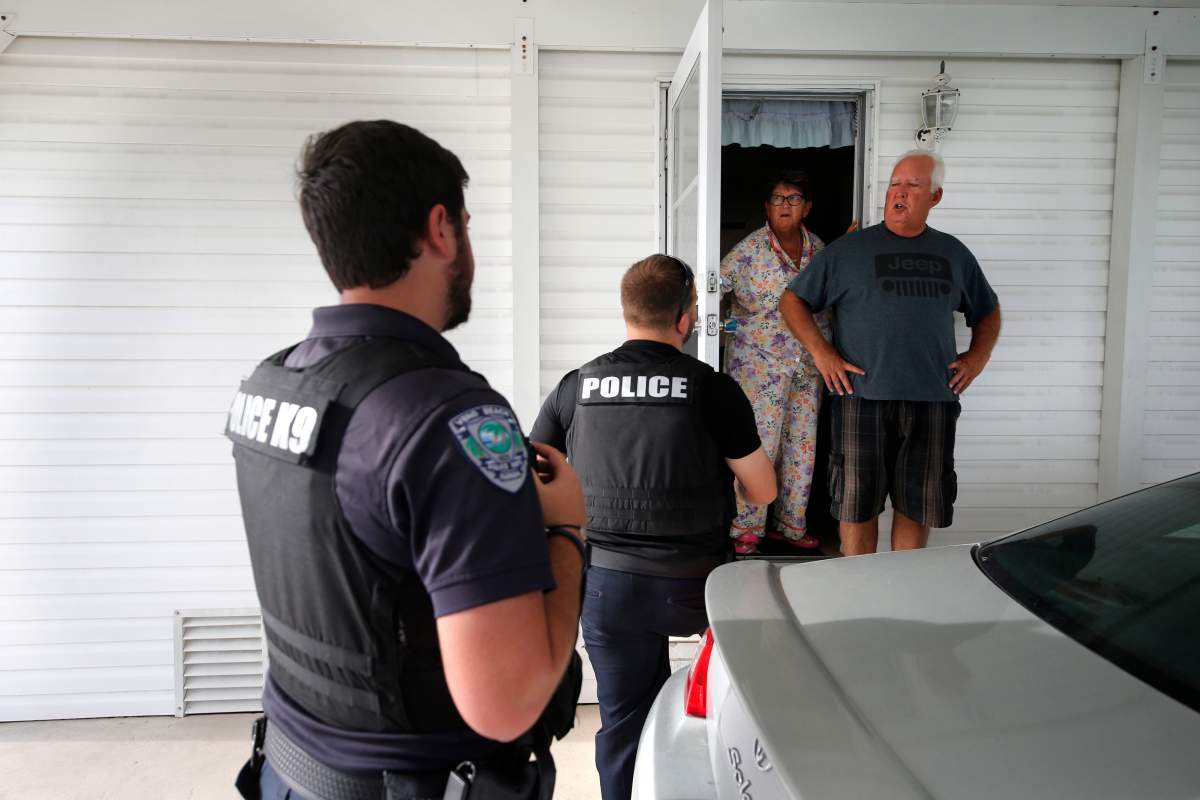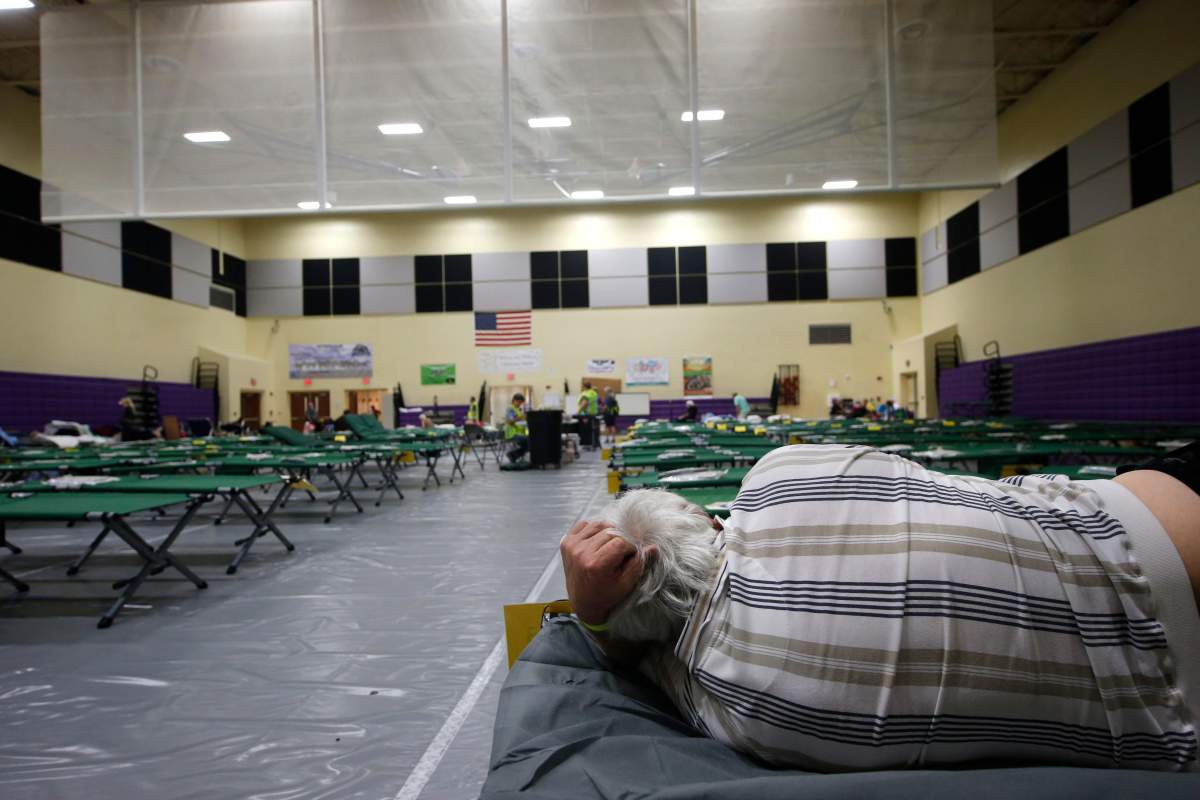Nearly 2,000 Canadians may be currently located in states that are caught in hurricane Dorian’s path. Florida, in particular, is a major destination for Canadians.

Government figures based on the voluntary Registration of Canadians Abroad indicate there are currently 1,161 Canadians registered in Florida.
There are also 220 Canadians registered in the Bahamas; 286 Canadians in Georgia; 197 in North Carolina, and 58 registered in South Carolina.
These figures are not considered complete, since registration on the Canadians Abroad service is completely voluntary.
LIVE UPDATES: Follow our liveblog here for the latest info on hurricane Dorian
The Government of Canada continues to monitor hurricane Dorian as it floods the Bahamas and prompts evacuations of coastal communities in Florida, Georgia and South Carolina.
“We continue to closely monitor hurricane Dorian’s trajectory and the situation in the affected areas and stand ready to provide consular assistance to Canadian citizens as required,” Global Affairs Canada said in a statement on Monday night.
WATCH: Dorian’s turn up north still unknown, will determine coastal impact in Florida

“Canadians in the affected areas should monitor local media for information and advice and follow the instructions of local authorities and emergency workers. We urge Canadian citizens in the affected areas to contact and reassure their loved ones, even if they have not been affected by the hurricane.”
Hurricane Dorian is slated to move “dangerously close” to Florida’s east coast late Monday through Wednesday night before it moves north to coastal Georgia and South Carolina on Wednesday night and Thursday, according to the U.S. National Hurricane Center.
WATCH: Florida governor says tolls suspended, storm focused more on east coast

Here’s a look at what’s happening across Florida on Sept. 2:
Evacuations and preparations
The Florida Division of Emergency Management is warning people in counties that have a hurricane watch or warning to not go to the beach.
It also provided a list of shelters open and functioning in various counties.
Florida’s emergency management director called Dorian the “strongest storm to ever threaten” the state’s east coast.
WATCH: Florida governor voices concern for power restoration once hurricane Dorian passes

“No matter what path this storm takes, our state will be impacted,” said Jared Moskowitz on Monday. “We will continue to work around the clock to prepare.”

Get daily National news
The emergency management division’s website has information on which counties are currently under mandatory evacuation orders.
Tolls have been suspended on Florida’s Turnpike Mainline and other toll roads, including:
- Alligator Alley
- The Turnpike Mainline (SR 91), including the Homestead Extension (SR 821)
- Sawgrass Expressway (SR 869)
- Beachline Expressway (SR 528)
- Orlando Beltway (SR 417 and SR 429)
- I-595 Express
- I-95 Express
- I-75 Express
Ridesharing apps are offering codes for transport to evacuation shelters. Uber says people who need a ride to an evacuation shelter in Florida can use code DORIANRELIEF in the app to get up to $20 off. Lyft says it is offering discounted rides using code DORIANRELIEF for evacuees till Sept. 15.
Airbnb hosts in Florida are also using the Open Homes program to offer temporary free lodgings for evacuees and hurricane relief workers till Sept. 16.
Disney World in Florida has revised its hours for Sept. 3 and is closing early.
With more than 17,000 workers from Florida Power & Light and other utilities prepared for Dorian, the company has put together the “largest pre-storm restoration workforce in company history,” according to Florida Governor Ron DeSantis.
The Florida National Guard spent Sunday night in Miami, preparing for any potential missions in reaction to the hurricane.
Reports of price gouging
As of Monday afternoon, Florida’s attorney general Ashley Moody said her office has received more than 2,000 reports of alleged price gouging.
Price gouging is increasing the price of an item “more than is justified” by its actual cost, according to the U.S. Federal Emergency Management Agency.
It is illegal in Florida to sell essential goods — such as food and gas — during a declared state of emergency for a price more than the average price of the commodity.
Moody activated the price gouging hotline last week, once Gov. DeSantis had declared a state of emergency.
“At this point we’re looking at about 2,100 contacts, assessing those to determine whether they meet the parameters of price gouging,” she told reporters Monday.
Travel
The government of Canada has issued travel advisories for both the Bahamas and for parts of the eastern U.S.
Canadians are warned to avoid all travel to the U.S. east coast — from north of Deerfield Beach in Florida to the Altamaha Sound in Georgia.
“The governors of Florida, Georgia and South Carolina have issued mandatory and voluntary evacuation orders for many coastal counties in their state,” the travel advisory stated on Monday afternoon.
“Due to the projected path of hurricane Dorian, Fort Lauderdale airport has announced that it would cease commercial flight operations on Monday, September 2, 2019 at noon. Contact your airline to check the status of your flight.”
If Canadians are already in these areas, they are instructed monitor local news, follow local authorities’ instructions, and contact their travel agent or operator over concerns about travel disruptions.
The Canadian government also recommends anyone visiting or living overseas to consider signing up for Registration of Canadians Abroad, which allows them to send notifications “in case of an emergency abroad” and receive information before and during natural disasters.
Canada is Florida’s primary source of international tourists, according to a 2018 report on the economic relationship between the two.
In 2017, 3.5 million Canadian visitors travelled to Florida, spending a total of US$6.5 billion. In addition, Canadians bought more than US$7 billion of real estate in the state in the same year. Florida was the number one U.S. state visited by Canadians in 2014, according to Statistics Canada.
“Canada remains Florida’s number one international patron of real estate by a considerable margin,” the Canadian government said in the 2018 report.
“Loyal snowbirds and other Canadians who own Florida property also inject several billion dollars annually into the economy through property taxes.”
— With files by the Associated Press











Comments
Want to discuss? Please read our Commenting Policy first.